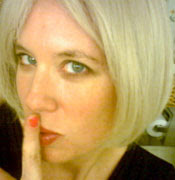
I've not until recently felt kinship with soldiers.
My parents were raised in Berkeley during the 60s, and although they had zero good things to say about "those hippies", I did the Birkenstock/calico skirts/Mexican ruffle top/hairy armpit Seattle thing, perhaps to spite them. This rebellion included campus organizing for abortion rights, protesting Iran-Contra, and holding signs down by the Pike Place Market against the war in El Salvador.
Two things bridged the gap I felt between myself and those who are trained to kill.
Being raped at knifepoint by an intruder to my home was the first. Now, my sentiments after the attack could well have swung me in the other direction. After all, rape is often a weapon of war, and Nicolas Kristoff of the NYT is a hero for exposing so publicly this blight on our humanity. We know that even our soldiers have raped, and often the victims are fellow United States soldiers. I hold this wariness of soldiers' training, of anything-can-happen-in-the-jungle mentality, very close. It is always on the tip of my tongue, ready to release invective. But I feel it in my bones, how close I came to dying. I was on that precipice, for about 3 hours. Soldiers on assignment, they feel it every minute of every day, for months, or years at a time.
I don't have to view soldiers as victims in the way I do the survivors of rape. After all, those returning from Iraq and Afghanistan signed up for it all. But when it comes to recovery, does it matter whether or not we chose our circumstances? In some respects, yes, perhaps. But which story am I to be less troubled by? That of a veteran who can neither sleep nor get out of bed for the flashbacks and the terror of stepping out into the raw outside world? Or that of a raped mother who can't listen to her child or pay the bills or shop for food because she's paralyzed with grief and depression? Suffering is the great equalizer. All who have seen death around the corner -- whether it's the left corner or the right, it doesn't matter -- share a kinship that makes for an odd family. But then what family isn't.
The second thing that bridged the gap was dating a soldier. I come from a line of Marines -- my father, two uncles, a cousin. But knowing a Marine, and kissing (et cetera) one, are two completely different scenarios. I was appalled at first to hear of his going upstate to play war games in the woods with his ex-Marine buddies. I blushed at the military humor bumper stickers plastered all over his car. I thought to myself, how in God's name did I end up here with him? But there was something tantalizing about exploring someone so, well, weird when considered in the context of my lefty world. I listened to him talk about discipline, loyalty, and self-control. I considered the parallels between Eastern martial arts and our military. And I frankly swooned at his confident bearing and "no, sir" and "yes, ma'am" replies to my colleagues at work. We didn't last, of course. Our worlds were just too far apart.
But I have that bridge now. I can step over and hold the hand of a soldier, and feel the common turf beneath us. I feel it in my bones, as keenly as I feel the terror, even now almost four years later. And so when I watch wounded soldiers getting scuba therapy, I think of the scuba certification I got in Mexico last year. I had gone to Mexico for a reason: the man who raped me was Mexican. I wanted to face my fear, look in the eyes of Mexican men, and not just see rapists. I wanted to purge the prejudice that poisoned me after the attack. It was the sea turtles off Playa del Carmen who helped me do that. I mean, how you can you look a sea turtle in the eye and not be grateful to be alive? After seeing those turtles, I was able to see men with a little more joy as well.
We need more of these programs like scuba therapy for returning soldiers. They are our brothers and sisters, and when they suffer . . . we need to feel it as our own, and act accordingly.



